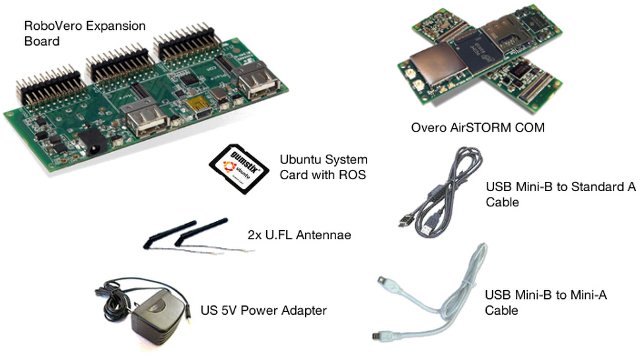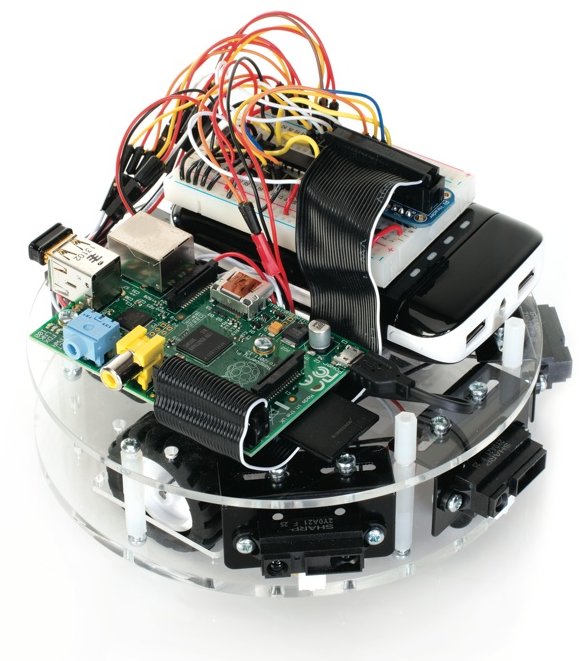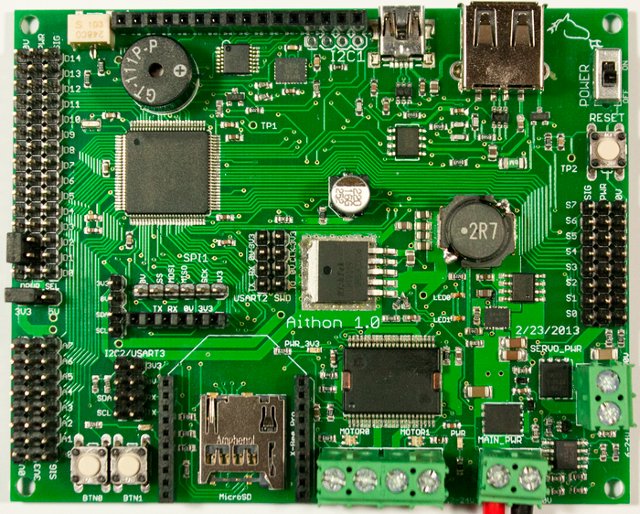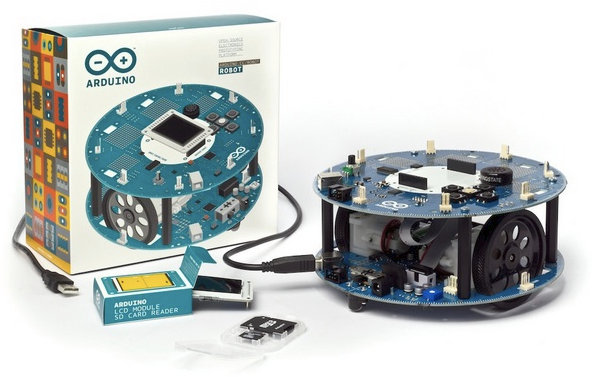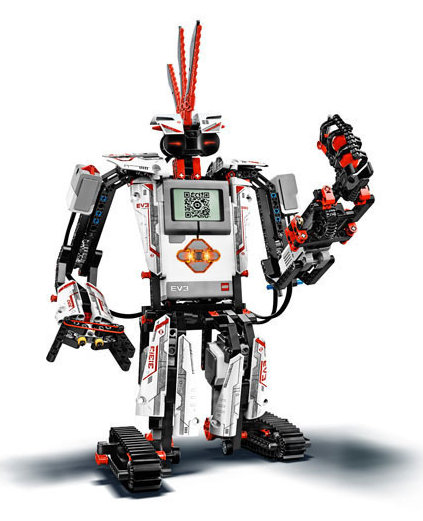Gumstix has recently unveiled several solution kits featuring their Overo and DuoVero Computer-on-Modules (CoMs), Pepper single board computer, and several expansions boards, together with required accessories, and software packages, in order to help their customers getting started more easily. All these solutions are based on Texas Instruments OMAP3, OMAP4, and/or Sitara processors, and run Linux (Ubuntu or Yocto), and sometimes Android for the kits with displays. The solutions kits target 6 different types of applications and/or markets: Robotics Robotic Development Kit (Pictured above) with one Overo AirSTORM CoM (OMAP3703), and RoboVero expansion board. The kit is better suited for motor control applications. Mobile Robotic Development Kit with one Overo AirSTORM CoM, and Turtlecore expansion board to be used with iRobot Create. The kits ship with a Linaro (Ubuntu for Overo) system card and Robot Operating System (ROS) pre-installed. Handhelds 3.5″ Handheld Development Kit featuring Overo AirSTORM CoM with Alto35 cutomizable […]
Frindo Open Source Robotics Platform for Arduino and Raspberry Pi Boards
Frindo is both a community and an open source robotics platform designed to work with Arduino, Raspberry Pi, and possibly other micro-controller boards. The platform is said to have been designed as an educational platform so that beginners can start with a simple robot, and build a more complex robot as their skills grow. There are currently three Frindo kits available from RobotBits.co.uk: Frindo chassis only kit for £64.95 (~$104) – Chassis plates, motors, wheels, wheel brackets, Arduino & Pi mounting kit & all hardware. Frindo Arduino kit for £110.95 (~$178) – Chassis only kit + Arduino, RobotShield, battery clip, power cable & USB cable Frindo Arduino kit plus sensors for £159.9 (~$257) – Arduino kit + 3x each: GP2Y0A21 analog distance sensors, bracket, cable & fixings The RobotShield is an Arduino shield optimized for mobile robotics applications with the following features: Dual bi-directional motor driver circuit (2 Amp Peak, […]
Embedded Linux Conference Europe 2013 Schedule – Build Systems, Security, Device Tree, Debugging & Profiling Techniques, and More
Embedded Linux Conference Europe 2013 will conveniently start right after LinuxCon 2013, last 2 days (October 23-24), and take place at the same location: the Edinburgh International Conference Center, Edinburgh, United Kingdom. The Linux Foundation has published the schedule for the conference, so I’ll make my own virtual schedule with sessions that I find particularly interesting. Thursday – 24th of October 9:30 – 10:10 – Timeline For Embedded Linux by Chris Simmonds, Consultant, 2net Limited Today, Linux is woven into the fabric of our technology. Things such as printers, routers, TVs and phones all have their own “Inner Penguin”. Yet it was never originally intended to be used beyond desktop and server PCs. A lot of things had to happen before Linux could break out of the PC environment and make its way in the world as a jobbing jack-of-all-trades. Since the early beginnings of embedded Linux in the late 1990’s many people have contributed […]
Lollybot is a $10 Robot Made with a USB Gamepad and Chupa Chups
I attended Barcamp Chiang Mai 6 yesterday, and sessions dealt with a wide range of subjects ranging from SEO and web development to things like nuclear energy, VMAT2 God gene, or Edward Snowden. There were just four talks somewhat related to the subjects I usually write about in this blog: Project Manhattan – An interactive TV infrastructure project for TV operators based on open source libraries (but not open source itself). They provide both back-end software and a mobile app (Android or iOS) for smartphones and set-top boxes. They had an Android set-top box, but unfortunately there was no time for demo. There’s no project website, but the solution is said to be used by horizon-tv.tv (in Russian). A Raspberry Pi session which I could not attend Firefox OS – Keng is the owner of a mobile and web development company called opendream, but he’s also one of the 4 […]
Aithon Motor Control Board Runs Chibios/RT RTOS
The Aithon board is a board powered by an STM32 Cortex M4 MCU destined at controlling motors and robotics applications. The board runs Chibios/RT, an open source RTOS, and a set of libraries are also provided to make programming the 2-channel motor driver, and other peripherals/sensors easier. Here are the specifications of the board: MCU – STMicroelectronics STM32F407 ARM Cortex-M4 @ 168 MHz, FPU, 512KB flash and 192KB RAM, up to 17 timers, an RTC, and 12-bit ADC I/O (All digital I/Os are 5V tolerant): 15 GPIO 8 ADC inputs and 8 PWM servo outputs Up to 3 USART (one shared with 1 I2C port + XBee) Up to 4 I2C (split between two independent buses) 1 SPI header 1 SWD header 1 12-bit DAC output (shared with SPI SCLK) USB – mini-USB (device) and standard USB (host) ports Expansion Headers: XBee socket Bluetooth header for optional Roving Networks RN42 […]
Arduino Unveils the Arduino Robot at Maker Faire
On top of announcing its first Linux powered board, Arduino also announced its first official robot at Maker Faire Bay Area called “Arduino Robot”. The robot comes with 2 wheels and two boards: The Motor Board controlling the motors. The Control Board reading sensors and deciding how to operate. Each board, based on Atmel ATmega32u4 MCU, is programmable like any other Arduino board using the Arduino IDE. Control board specifications: MCU – Atmel ATmega32u4 @ 16 MHz with 32KB flash, 2.5KB SRAM, and 1KB EEPROM External Storage – 512 Kbit EEPROM (I2C) + SD card reader for FAT16 formatted cards Display – Full color LCD over SPI communication I/O interfaces: 5x Digital I/O Pins 6x PWM Channels 4x Analog Input Channels (of the Digital I/O pins) 8x Analog Input Channels (multiplexed) Misc – 5 keys keypad, Knob potentiometer attached to analog pin, 8 Ohm speaker, digital compass “Playground” – 3x I2C […]
A Selection of FOSDEM 2013 Events
FOSDEM is a 2-day (or 3 if you include Friday beer event) event where over 5,000 members of open source communities meet, share ideas and collaborate. It’s free to attend, and there’s no registration, so you just show up to attend. FOSDEM 2013 takes place on Feb 2-3 (yep, this week-end) in Brussels There are 7 main tracks where sessions are organized: Operating systems Open source challenges Security Janson Beyond operating systems Web development Miscellaneous Robotics There are also keynotes and devroom for a total of 488 sessions. Developers rooms that may particularly be of interest to readers of this blog are: Cross Desktop devroom – e.g. Wayland, gstreamer, razor-qt, Qt Project, Plasma Active, etc… Cross Distro devroom – e.g. Linux on Android, suse on ARM, ARMv8, systemd, etc… Embedded and mobile devroom – e.g. Baserock Embedded Linux, Guacamayo (Yocto), Nemo Mobile/ Mer project, arduino… All in all that’s a […]
Lego Mindstorms EV3 Hackable Robots Run Linux
The LEGO Group has announced LEGO MINDSTORMS EV3, a new platform for consumer robotics designed for both younger generation and robotics enthusiasts, at CES 2013. MINDSTORMS system is powered by the new EV3 Intelligent Brick, that comes with more memory (64 MB + 16 MB internal flash memory) and a faster processor (ARM9 @ 300MHz), and runs a Linux-based firmware. EV3 Intelligent Brick also features an infrared port, a 178×128 LCD interface, a USB host port and SD expansion slot, and is now compatible with iOS and Android for remote control via Bluetooth 2.1. Thanks to 6 buttons present on the EV3, users can now program many functions directly, in addition to the ability to download programs from a desktop computer. Lego claims a simple robot can be built in 20 minutes without having to plug it into a PC. Beside EV3 intelligent brick, the set comes with 550 Lego Technic […]


